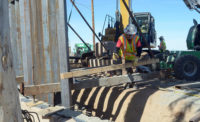The $464-million expansion of a Colorado dam near Boulder moved a step closer to construction when a federal judge dismissed environmental groups' legal claim that three federal agencies that approved the project violated federal law. Judge Christine Arguello said March 31 that the US district court in Colorado did not have jurisdiction to hear the case because of the project's order to proceed from the Federal Energy Regulatory Commission.
Expansion of the Gross Reservoir dam near Boulder, Colo., will raise its height by 131 ft to 471 ft, allowing it to nearly triple in size. When complete, the reservoir will be capable of holding about 119,000 acre-ft of water. The structure was built in 1954. Utility Denver Water is expanding the reservoir to address a known imbalance in the city’s drinking water system, which supplies 1.4 million people, one-quarter of the state population.
The project design by a Stantec/AECOM joint venture is about 90% complete. Construction is set to begin by July 2022 and must be finished by July 2027, as mandated by FERC.
Denver's Board of Water commissioners approved last July a two-year, $4.5-million contract to a Kiewit-Barnard joint venture for planning and preconstruction during the final design phase
Dam Will Set Records
Denver Water also awarded the team the construction management and general contracting contract, an agency spokesman told ENR. It will begin negotiations with the joint venture for the construction phase to start later this year.
The project calls for adding 900,000 cu ft of concrete to the existing structure and building the first roller-compacted concrete arch dam in the U.S.
When complete, the Gross Reservoir will be the tallest in Colorado and the tallest roller-compacted concrete dam in the U.S.
Denver Water must still obtain a permit from Boulder County, which said it would accept public comments during the entire review process. The agency has not set a date to complete its review or issue the permit.
FERC in July 2020 ordered Denver Water to proceed with design and construction of the hydroelectric dam’s expansion under its Federal Power Act license. The U.S. Army Corps of Engineers issued a Section 404 Clean Water Act permit in 2017 and the Colorado Dept. of Public Health and Environment issued its permit in 2016.
Permitting began in 2003.
The Sierra Club and other environmental group opponents challenged the Corps permitting process but not the FERC order.
“This case involves an inadequately examined and poorly executed permitting process,” the complaint says of the Corps’ review. The groups note “extensive” environmental damage and agency failure to consider a “reasonable range of viable alternatives.”
The groups also said the U.S. Fish and Wildlife Service violated the Endangered Species Act by issuing a “fatally flawed” biological opinion about the project environmental impact, which led to Corps approval. Opponents also named the US Interior Dept. in their lawsuit..
The US district court ruled that only federal appeals courts have jurisdiction over a FERC order, even though the environmental groups did not challenge the one for the project.
When challenging another agency directive that is "inextricably linked" to the FERC order, the Federal Power Act’s exclusive jurisdiction provision "precludes this court from exercising jurisdiction,” judges said.
The environmental groups and their attorneys did not respond to ENR’s request for comment on whether they will appeal the district court decision to the U.S. Court of Appeals in Denver.





Post a comment to this article
Report Abusive Comment